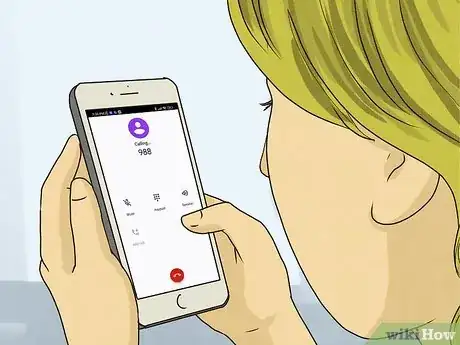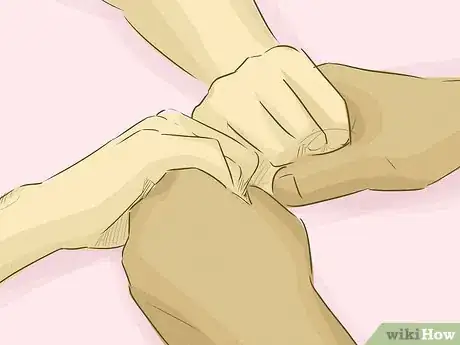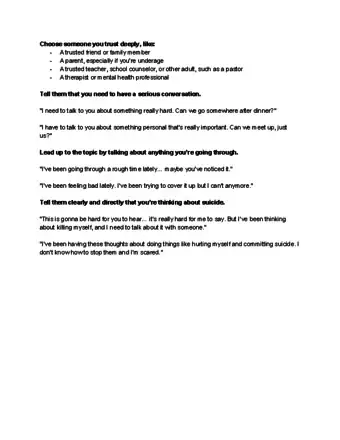This article was co-authored by Trudi Griffin, LPC, MS. Trudi Griffin is a Licensed Professional Counselor in Wisconsin specializing in Addictions and Mental Health. She provides therapy to people who struggle with addictions, mental health, and trauma in community health settings and private practice. She received her MS in Clinical Mental Health Counseling from Marquette University in 2011.
This article has been viewed 114,650 times.
Telling somebody that you’re having suicidal thoughts can be a difficult endeavor, especially since suicide is often stigmatized and can be a taboo subject. However, talking to a person you trust is an important step in processing your suicidal thoughts and preventing yourself from taking drastic action. Find time to talk to a trusted adult friend or family member, or a person in a position of authority—for example, a mental health professional, priest, or teacher. Tell them directly that you're suicidal, and look into therapy or counseling as a route to decrease suicidal thoughts.
Steps
Finding Someone to Confide in
-
1Decide to talk to a trusted friend or personal confidante. While it’s necessary to tell someone that you’re considering suicide, doing so is not an easy task. When considering who to tell, select a person that you feel you can trust, and who will respond to the information you share with them in a calm, compassionate way and without passing judgment. The person can be a friend, a family member, a co-worker, or a mental-health professional.[1]
- Some individuals may respond with judgment, or tell you to “just deal with” your suicidal urges. If someone says this to you, ignore the advice, and find a different person to confide in.
-
2Choose a trusted adult to talk to if you’re a teen. If you’re comfortable telling your parents, they’re most likely your best option. Or, reach out to an adult family member that you trust, like an aunt, uncle, or grandparent.[2] If you’re not close to any family members, talk to an adult you know and trust, like your school’s counselor or a member of your religious organization.
- If you’re a teen, you might feel like you should tell a peer, but friends of your age may not be able to effectively handle the situation. Talk to a trusted adult instead.
Advertisement -
3Call a suicide hotline if you’re considering committing immediate suicide. Suicide hotlines exist for people who feel that they have nobody else to tell about their suicidal thoughts, or who are considering immediate suicide. If you’re seriously thinking about killing yourself within a short period of time—say, 1 hour—and nobody’s around, call a suicide hotline.[3]
- If you live in the U.S., call or text the Suicide and Crisis Lifeline at 988.
- If you can’t call a hotline on the phone for whatever reason, search for online crisis hotlines or text messaging services.
Explaining Your Suicidal Thoughts
-
1Let someone know that you’d like to have a serious conversation. The conversation will be most effective if you let your confidante know in advance that you’d like to discuss a serious, personal topic with them.[4] Instead, you could say to the person, “There’s something personal I wanted to talk to you about and it’s very important. Can we talk privately after dinner?”
- If the person says “no,” or doesn’t seem interested in helping you, reach out to someone else.
-
2Tell your confidante that you’re thinking about suicide. This conversation may be difficult, but it’s not the time to use euphemisms or vague phrases. Do not say things like, “I’m through,” or “I can’t deal with everything anymore.” Instead, use direct language. Say something like, “This may be hard for you to hear, but I often think about killing myself. It’s hard to resist these thoughts. I’d like to be able to confide in you about these impulses.”[5]
- Also tell the person if you have a specific plan for how you might commit suicide.
- You might be afraid of upsetting your confidante, but understand that if you do take your life, this person and many others will be far more upset.
-
3Continue the conversation if the person reacts with shock. Hearing that a child, friend, or family member has suicidal thoughts can be surprising or difficult to hear. Ideally, your confidante will react with support and sympathy. However, they may initially react with surprise or disappointment. If they do, don’t give up on the person as a confidante. Keep explaining your thoughts and impulses to commit suicide. Ask your confidante how they feel about this information, and talk through their feelings if necessary.[6]
- If the person who you confide in reacts with surprise or dismay, say something like, “I understand that this is a lot for you to deal with all at once. If you need to take time to process this information, I understand. But, I’d like to be able to still talk to you about this issue in the future.”
-
4Allow your confidante to bring in additional help. In order to help you, your confidante may need to tell others (e.g., a mental-health professional) about your suicidal thoughts. During your conversation, explain that it’s alright with you if your confidante mentions your suicidal thoughts to others.[7]
- Say something like, “If this is too much for you to handle alone and you need to tell someone else, I’ll understand.”
- Or say, “If you want to tell a counselor or therapist that I’m suicidal, that’s okay with me.”
-
5Write down your feelings if you’re not comfortable speaking them. Telling someone that you’re considering killing yourself can be incredibly difficult and emotionally taxing. If you don’t think you’re up to the task, try putting your suicidal thoughts into words.[8] Give the letter to your intended confidante and, if possible, sit with them while they read it.
- For example, write your parents a letter that begins with a couple sentences like, “Mom and Dad, I have a serious issue I want to tell you about, but I can’t bring myself to say it out loud. I often think about killing myself, and am worried that I may act on these thoughts.”
Finding Resources for the Future
-
1Build a safety plan with people you trust. A safety plan is a set of specific steps that you can act on any time you’re feeling suicidal. A primary step in your suicide safety plan should be to call your doctor or counselor. Also make a list of friends and family members who you can call when you’re having suicidal thoughts.[9]
- Avoid spending time alone if you’re having suicidal thoughts. No matter the time of day or night, if you’re thinking of ending your own life, spend time around others until the suicidal thoughts subside.[10]
- Be sure to confirm beforehand with your friends and family members that they’re willing to be called when you’re suicidal.
-
2Seek out a therapist or psychiatrist. If you have recurring thoughts of suicide, especially if they’re accompanied by depression, bipolar disorder, or any other mental-health disorder, it’s important to see a mental-health professional. A therapist will be able to suggest alternate thought processes and mental habits that can help you think of suicide less, and can also prescribe medication as needed.[11]
- Keep in mind that therapy is not a “quick fix” for suicidal thoughts. It can take months or years to fully work through these thoughts and to stop thinking about suicide.
- Suicidal thoughts can also be the result of another condition or a medication you are taking, so be sure to give your therapist or psychiatrist a thorough overview of your situation.
-
3Establish a support system of trusted family and friends. A mental-health support system is an invaluable resource in processing suicidal thoughts and avoiding suicidal behaviors. Your support system should comprise various individuals in whom you can confide your thoughts and feelings, and who can be “on-call” should you have strong suicidal feelings at any point in time.[12] A support system can include:
- Parents and family members.
- Your therapist or counselor.
- Members of your church or other religious organization.
- A support group for people dealing with suicidal thoughts.
-
4Avoid self-medicating. Abusing drugs (illicit or prescription), alcohol, and/or other substances as a way to feel better and control your pain is called self-medicating.[13] If you find that you are becoming dependent on 1 or more substances, then seek help immediately. Talk to your doctor or therapist and let them know what is going on.
Help Talking About Suicidal Thoughts
Warnings
- Never bottle suicidal feelings. They will not go away on their own, no matter how hard you wish them away. If you are having any suicidal feelings, you should tell someone right away.⧼thumbs_response⧽
References
- ↑ https://www.helpguide.org/articles/suicide-prevention/are-you-feeling-suicidal.htm
- ↑ https://themighty.com/2016/12/how-to-tell-your-parents-you-want-to-die/
- ↑ https://www.helpguide.org/articles/suicide-prevention/are-you-feeling-suicidal.htm
- ↑ https://www.helpguide.org/articles/suicide-prevention/are-you-feeling-suicidal.htm
- ↑ https://themighty.com/2016/12/how-to-tell-your-parents-you-want-to-die/
- ↑ https://www.beyondblue.org.au/the-facts/suicide-prevention/worried-about-suicide/talking-to-someone-about-your-suicidal-feelings
- ↑ https://www.beyondblue.org.au/the-facts/suicide-prevention/worried-about-suicide/talking-to-someone-about-your-suicidal-feelings
- ↑ https://themighty.com/2016/12/how-to-tell-your-parents-you-want-to-die/
- ↑ https://www.helpguide.org/articles/suicide-prevention/are-you-feeling-suicidal.htm
- ↑ https://www.beyondblue.org.au/the-facts/suicide-prevention/worried-about-suicide/talking-to-someone-about-your-suicidal-feelings
- ↑ https://www.mayoclinic.org/diseases-conditions/suicide/diagnosis-treatment/drc-20378054
- ↑ https://www.mayoclinic.org/diseases-conditions/suicide/diagnosis-treatment/drc-20378054
- ↑ https://americanaddictioncenters.org/adult-addiction-treatment-programs/self-medicating/
- ↑ https://www.helpguide.org/articles/suicide-prevention/are-you-feeling-suicidal.htm
About This Article
Telling someone that you’re suicidal can be really hard, but it’s the first step to getting yourself the help you need. Tell a friend or family member you trust. You might not want to upset or worry them, but they’d be even more upset if anything happened to you, so it’s important to reach out now. Let them know you need to talk and schedule a phone call or a conversation so they have a little time to prepare themselves. When you talk, say something like, “This may be hard for you to hear, but I’ve been thinking about killing myself recently and I needed to tell someone.” If you don’t want to tell them in person, write them a letter or a text to explain how you’re feeling. Alternatively, tell your doctor or call a suicide hotline if you’d feel more comfortable talking to someone you don’t know. Things might seem hopeless right now, but once you get some help, you’ll start to feel better. For more tips from our co-author, including how to build a support system to help you when you feel suicidal, read on.














































































